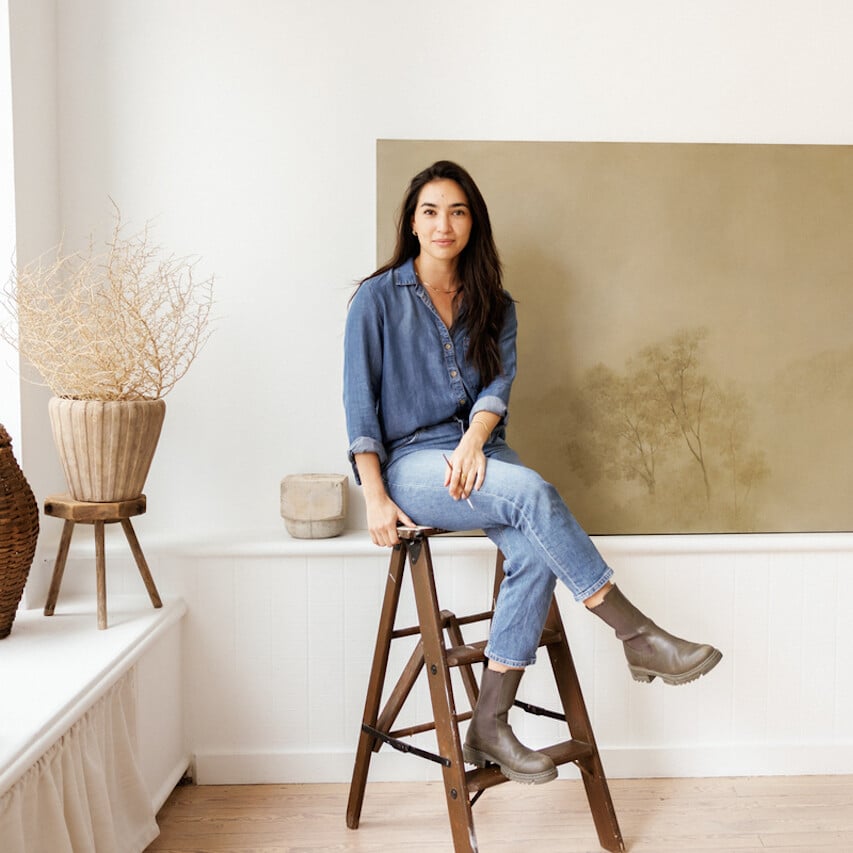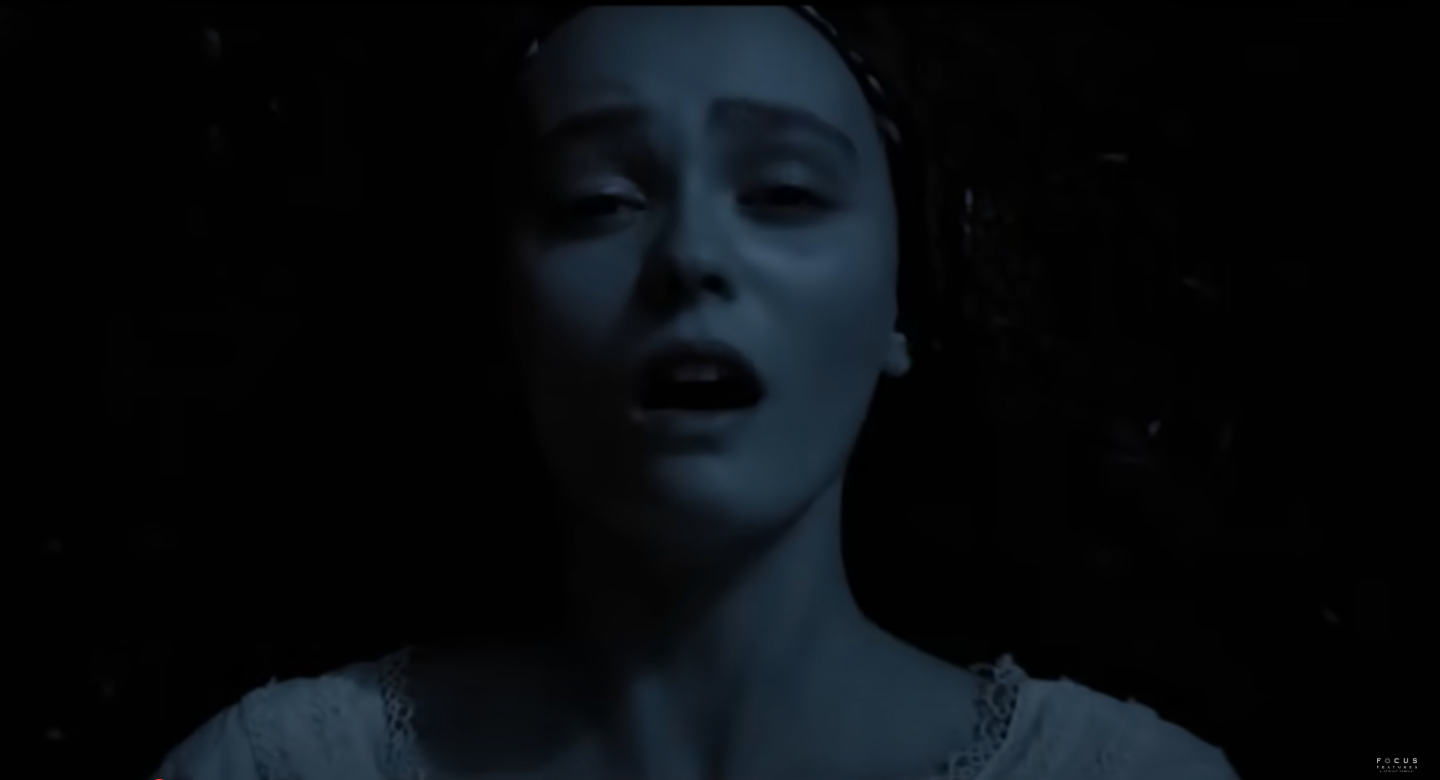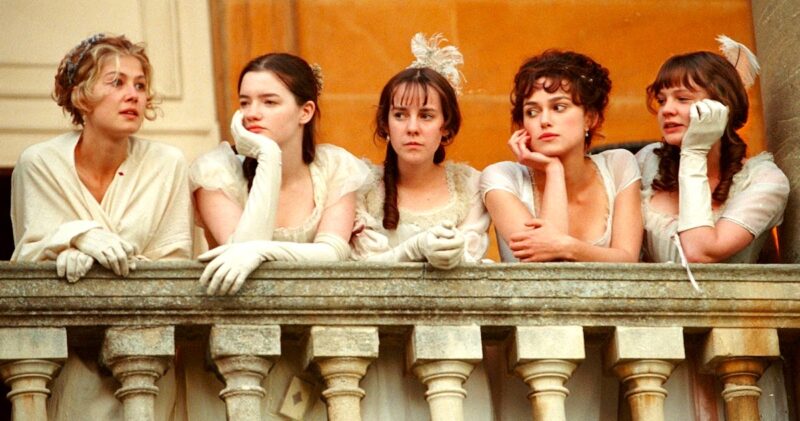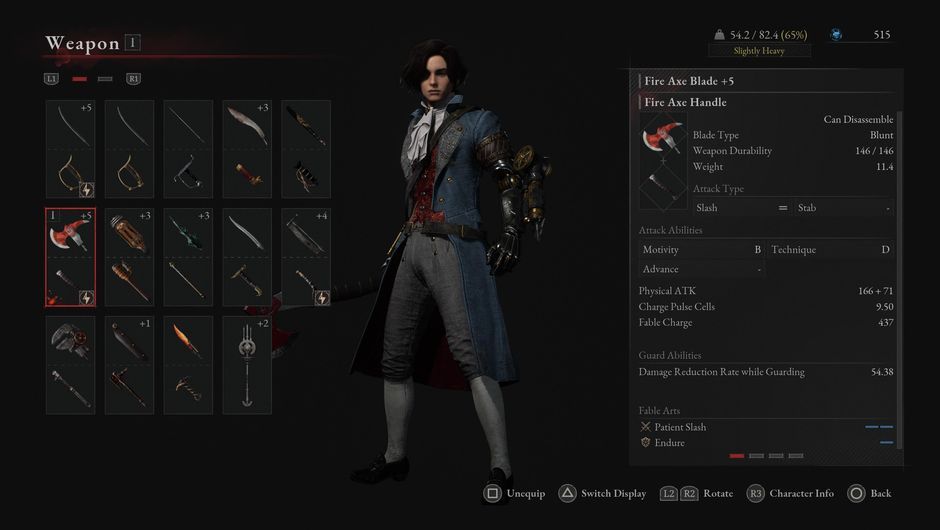“I never assumed that I would make real friends through Jane Austen memes.”
—Jane Austen First Drafts’ Andrea Schwartz
In the fall of 2021 I found myself standing at the front of a conference room at the Marriott Hotel in Chicago, explaining how TikTok works to an audience of mostly middle-aged and older, mostly women of the Jane Austen Society of North America*. Some of them were in bonnets.
I was there as a result of my following on Jane Austen TikTok—moderate by most standards, but devoted within my niche. I co-presented with two other under-35-ers, Linley, a board member of the Greater Chicago chapter of JASNA[1] who initially reached out to me about participating in the talk, and Elizabeth, a fellow AustenTok-er known as misselizabeth1813. The theme of the conference that year was Jane Austen in the Arts, and our presentation, “The Jane Austen Society of TikTok,” discussed the process of adapting the works of Jane Austen for short-form video, often within a meme format. At the time I was earning my master’s degree in communication with an emphasis in new media, and so I was appointed to explain how the TikTok algorithm works. The explanation I gave sounded pretty good, I think, but it was total BS. Nobody, including the employees of TikTok, understands how the TikTok algorithm works.
The main part of our presentation explored the inherent challenges and mechanics of adapting Austen’s work to a specific type of short-form video content that thrived on TikTok at the time (and still does to a lesser extent at the time of this writing). This type of video involved the meta-textual framing of a scene or character from a work, in our case, from Austen’s text, by layering it with a parallel or contextually relevant scene or character from a different media work through the use of sometimes a video, but most often an audio clip. Countless TikTok creators use this same method of intertextual framing to adapt textual and extratextual (imagined, “off-page” or “off-screen”) scenes and character interactions from media works ranging from Game of Thrones and Star Wars to Parks and Recreation and New Girl, as well as books from all genres and eras.
Even a cursory reading of Austen’s novels, not to mention some of her letters, reveals a biting wit and snark even the edgiest Redditor would have to admire.
Currently, TikTok videos can be up to 10 minutes long, and in 2021 they could be up to three minutes, but for this specific type of adaptive content, these scenes are most effective in videos under 30 seconds, ideally under 15. To best make use of this timeframe, the scene in question has to be distilled down to its most essential parts; precision and specificity are the name of the game, a single micro-scene or character interaction. It helps if the audio clip being used is particularly sound byte-y. To fully explain it may be best to illustrate with an example. One video we showed in the presentation was one of my own in which I used an audio clip from The Office to adapt a scene from Pride and Prejudice. The Office scene reads as follows:
Dwight: I’m a very busy man, let’s get right down to business.
Jim: Okay.
Dwight: Jo is coming later today. I cannot have a subordinate trying to make me look stupid. Okay? I need you to promise me you’ll be on your best behavior.
Jim: I promise… -d other people that I would be on my worst behavior. And I gave them my word, so…
In the video, I lip sync the dialog for both characters, wearing a hat when I’m performing the Dwight lines. At the beginning of the video a text box appears that reads “Mr. Collins Before Going to Dinner at Rosings,” and then a label appears during the first Jim line reading “Lizzy Bennet,” indicating that the “Dwight” lines are being said by Mr. Collins and the “Jim” lines by Elizabeth. Honestly, the character parallel between Dwight Schrute and William Collins delights me endlessly. The corresponding passage in the book reads:
Scarcely anything was talked of the whole day or next morning but their visit to Rosings. Mr. Collins was carefully instructing them in what they were to expect, that the sight of such rooms, so many servants, and so splendid a dinner, might not wholly overpower them.
When the ladies were separating for the toilette, he said to Elizabeth—
“Do not make yourself uneasy, my dear cousin, about your apparel. Lady Catherine is far from requiring that elegance of dress in us which becomes herself and her daughter. I would advise you merely to put on whatever of your clothes is superior to the rest—there is no occasion for anything more. Lady Catherine will not think the worse of you for being simply dressed. She likes to have the distinction of rank preserved.”
You may note that Mr. Collins doesn’t actually say anything to Elizabeth about how to behave while in the presence of the illustrious Lady Catherine de Bourgh (whom I had cast as Kathy Bates’ guest role on The Office, Jo Bennet), and Elizabeth neither does nor says anything as snarky as Jim’s response to Dwight. But you’ll never convince me that she didn’t want to!
The scene presented in my video, then, is both textual (because it depicts an event that does actually happen in the text) and extratextual, or perhaps subtextual; I’ve imagined the unspoken thoughts these two characters are “really” thinking as if they had verbalized them during a canon scene.
And now that I’ve explained this joke to you, it’s no longer funny, is it? But this is an example of the process of how, not just an Austen text, but any work can be meme-ified. And memes, if you ask any Redditor, are the lifeblood of online fandom.
Ten years ago Deborah Yaffe published the definitive popular cultural study of Jane Austen fandom, Among the Janeites. She frames her examination around her attendance at an Annual General Meeting of JASNA, the same event (though a different year) at which I presented my TikTok meme explanation. Her assessment of the fandom through attendance at the JASNA event notes that this segment at least is mostly white, mostly women, and mostly college-educated, though within those commonalities there is a lot of diversity of background, occupation, age, and even approach to Austen’s work, encompassing “academics who condescend to bonnet-wearing enthusiasts and unabashed swooners who love ogling Colin Firth in a wet shirt” [or Matthew Macfadyen’s “hand flex” after helping Keira Knightley into a carriage] “at least as much as they love rereading Pride and Prejudice.”
At the time, Yaffe noted that finding community with other Jane Austen fans was easier than it had been in decades past, due to a little thing called the internet. She writes:
Today, no junior Janeite need curl up alone with her book in a dark corner. She can start a blog, join the online Janeites discussion group, or hang out at the Republic of Pemberley. She won’t feel isolated in her love because nowadays Jane Austen is everywhere.
Online fandom has changed dramatically since 2013, with more platforms, greater participation, shifting cultural attitudes, and evolving online etiquette, and these changes extend to the Austen fandom. Jane Austen TikTok is one facet of an online community that spans platforms, age demographics, and camps of Austen interpretation. The fandom on social media tends to break down along similar age group lines as each platform’s general user base; Jane Austen TikTokers tend to be Gen Z and younger Millennials—I’m very much on the older end of the spectrum among the TikTok Janeites—while Jane Austen Facebook groups seem to be made up of mostly Boomer and Gen X fans. Twitter and Instagram tend to have a broader age range, at least in my experience, and those two platforms are where the best memes are.
“As I scroll through social media I default back to coming up with Jane Austen jokes,” says Andrea Schwartz, the mind behind Jane Austen First Drafts, an Austen meme page with 12.5K Twitter followers. “I can’t watch the news anymore without thinking, ‘Is there an Austen angle to this story? How do these billionaire-hungry orcas relate to Jane Austen?’”
I can relate somewhat to Schwartz’s dilemma. As I write this, I have a recent Twitter thread that’s racking up likes and retweets and details what different Austen characters would choose for their “girl dinners.”
It turns out Austen fans are hungry (no pun intended) for pop culture crossover content, and the author has enough casual fans that these memes have the potential for broad appeal. “The internet loves anything and everything about Pride and Prejudice,” comments Schwartz on one of her earliest viral memes, a text-only tweet reading, “’Slut era’ I say, as I lie on the couch and rewatch Pride and Prejudice (2005) for the thousandth time.” “That one got around 50k likes. It’s so wild to me that my account took off the way it did.”
Schwartz’s first ever viral meme included a photo of actress Claudie Blakley as Charlotte Lucas from the 2005 Pride and Prejudice adaptation. The caption quoted her iconic line from the film, but with a twist: “I’m twenty-seven years old, I’ve no money and no prospects. I’m already too old for Leonardo DiCaprio and I’m frightened. So don’t you judge me, Lizzy. Don’t you dare judge me!”
“That tweet ended up getting around 70k likes, which was wild since my tweets were averaging around 50 likes on a good day,” recalls Schwartz. “In the end, I gained 5,000 followers off of that one joke, so thanks, Leo.”
Every Janeite will tell you that Austen’s books are just as relevant now as they were 200 years ago, because while they do depict some outdated social customs, they also explore human nature and interpersonal relationships in universal and era-transcending ways. Even a cursory reading of Austen’s novels, not to mention some of her letters, reveals a biting wit and snark even the edgiest Redditor would have to admire.
Austen is unmatched in creating comedic side characters, and some of these iconic characters make for the best meme fodder. Mr. Collins, as I’ve demonstrated, memes very well, with moments such as his excitement over the shelves in the closet at the Rosings parsonage, and his compliment of the “EX-cellent boiled potatoes” at Longbourn (yes, I know that’s only in the 2005 film and not in the book, but Austen fans love it) being the most popular. Austen’s other buffoonish clergyman, Mr. Elton from Emma, also gets meme-fied fairly often, as well as other Emma characters including Harriet Smith, Miss Bates, and Mr. Woodhouse. And, perhaps surprisingly, Louisa Musgrove from Persuasion seems to get a fair amount of meme attention, especially her story-defining jump/fall down the stairs at Lyme.
While a lot of Jane Austen memes may be funny and snarky, they’re also a means of forging genuine connections between fans. Around the time I pestered Andrea Schwartz with questions about Jane Austen First Drafts, we were both preparing for presentations at Virtual JaneCon, an all-online, free and inclusive Austen fan event featuring two days of video premieres and livestreams on a broad range of Austen-adjacent topics. The organizers of Virtual JaneCon include women of color and queer people, and they strive to make the event a safe and radically inclusive space for all Austen fans. The group is spearheaded by Bianca Hernandez-Knight, formerly of the meme account Drunk Austen, and kind of a legend among the online Austen fandom.
“In my eyes, Bianca is the pinnacle of Jane Austen meme-ification,” says Schwartz, noting that at the time that she started Jane Austen First Drafts, she wasn’t very familiar with Austen fandom. “But I quickly found the tight-knit Austen humor community on Twitter.”
This tight-knit Austen community which I personally am honored to be a part of is also a uniquely inclusive and progressive space, when compared to other segments of Austen fandom. In Facebook groups and to a lesser extent on other platforms, you’ll find what Hernandez-Knight refers to as “Lady Karens,” typically white women who use Austen fandom to express thinly-disguised (or sometimes not even disguised) bigotry.
Lady Karens complain about Austen adaptations having racially diverse casting because it’s “not historically accurate,” or play victim when asked not to use problematic language. As with all other corners of culture and society, these expressions, however covert, of white supremacy send a message to people of color, LGBTQ+ folks, and those of other marginalized identities that they are not welcome in the Jane Austen fandom.
Adapting her iconic scenes for online consumption gave me a deeper appreciation for her comedic genius. Discussing her characters and themes with other fans gave me a fresh perspective on these books I’ve loved for half my life.
I personally noticed this “Lady Karen” attitude moving to the forefront of several Austen Facebook groups I was in during the summer of 2020, which of course was a time of profound reckoning for much of white America. A familiar pattern developed: a person of color or white ally would post in the group about a topic relevant to Austen fandom, but with an invitation to consider the deep-seated racial biases we all have related to that topic (for example, how the Bertrams’ wealth in Mansfield Park is tied to the enslavement of Africans on their West Indies plantation, and how that might affect our understanding of the characters). Then a host of Lady Karens would chime in with polite requests to “stay away from politics,” before the more hostile comments about how people of color “just want to complain,” or how white people have “suffered, too.” If you’ve ever been in any Facebook group where such discussions were attempted, I’m sure you can imagine.
I eventually left those Facebook groups and turned more to Twitter and Instagram for my Austen community, and of course to my growing connections on TikTok, which I had downloaded along with the rest of the Millennials in March of 2020.
So it was through Twitter and Instagram that I first saw Bianca Hernandez-Knight’s posts announcing the first ever Virtual JaneCon. Everything had to be virtual in the summer of 2020, but making the event 100% online meant it was also accessible to people all over the world. And with the intentionally articulated mission of seeking “to uplift historically marginalized voices in the Austen community,” the event creates a space that is the antithesis of those Austen Facebook groups. Of course no person and no community is perfect, but organizations like Virtual JaneCon do a lot of the important work of creating safe spaces in the fandom where Lady Karens are not welcome, but all other fans are.
“Let other pens dwell on guilt and misery…”
Memes have brought us together. Maybe we started out just wanting to make really niche jokes about our favorite author, but it turns out there’s real camaraderie to be had in online community. Schwartz notes, “I set [my account] up assuming I would meet a few Austen lovers and then I would eventually get bored and go back to lurking on Twitter. I never assumed that I would make real friends through Jane Austen memes.”
When I started posting Jane Austen content on TikTok during the early, sourdough starter, Love is Blind season one days of quarantine, it was just because I hadn’t seen any on that app yet, and I thought it would be fun. The response to my early Austen memes seemed positive, so I started posting longer discussions of the novels and connections to pop culture. Once I hit the required 1,000 followers, I started going live to chat with other Austen fans and do Pride and Prejudice read-alouds, which pulled in pretty respectable viewer numbers for my small follower count. And I really was just having fun.
I never thought that I would get the attention of authors and publishers of Austen-adjacent books (Regency romances, modern Austen retellings, etc.) who would send me copies to review and promote. I never thought I would be invited to speak at the most prestigious Austen fan event in North America, or that that would end up leading to a professional opportunity.
And I never thought that I would make real friends, some of whom I’d get to meet in person, like my co-panelists at JASNA, or my friend Kerri, whose production of the Kate Hamill stage adaptation of Sense and Sensibility I was able to see when I visited Los Angeles earlier this year. I even had a group with whom I played the Austen-themed RPG Good Society over Discord for awhile, all of whom I met through the online Austen community.
But the most surprising thing I never thought would happen was that I would come to love Jane Austen even more than I already did. Adapting her iconic scenes for online consumption gave me a deeper appreciation for her comedic genius. Discussing her characters and themes with other fans gave me a fresh perspective on these books I’ve loved for half my life. And sharing my own love for Austen and witnessing my friends’ equal love for her made me feel more connected to an online community than I ever had before.
Maybe the real memes were the friends we made along the way.
[1]It must be noted that JASNA has a documented history of unfair treatment of its members of marginalized identities, and for the 2021 Annual General Meeting, several scheduled presenters had pulled out because of this. I was aware of the issue at the time, but I had seen what I thought were signs of positive change and thought I might be able to help push the organization in the right direction from the inside. However, further events that I won’t get into here transpired that convinced me otherwise, and I’ve since left the organization.



























































